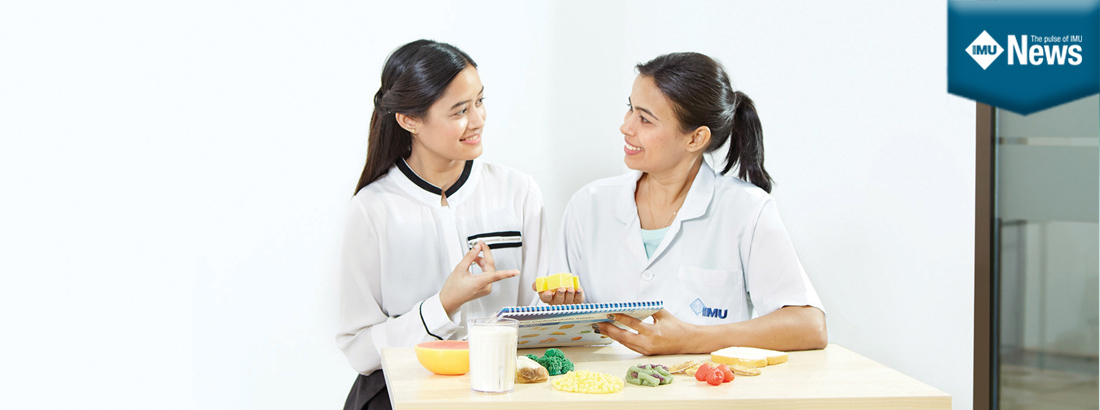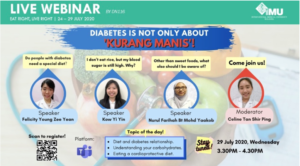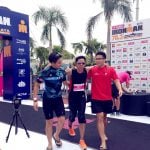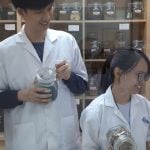As a final year student from the DN116 cohort in Dietetics with Nutrition Programme, International Medical University (IMU), I was fortunate to be the leader of a series of webinars to advocate for “Eat Right, Live Right”. The five webinars were conducted from 23 July to 29 July. This opportunity came as part of fulfilling the remaining credits hours in community placement which was brought to a halt due to the Covid-19 pandemic and the ensuing Movement Control Order. These webinars were conducted to impart knowledge on dietary management and lifestyle intervention in hypertension, gout, high blood cholesterol, chronic kidney disease and diabetes.
| Date | Date of Webinar | Time |
|---|---|---|
| 24 July | Diet and Cholesterol, What You Need To Know | 10.00am – 11.00am |
| 28 July | The Gout Diet: What’s In and What’s Out? | 10.30am – 11.30am |
| 28 July | Diet and Kidney: Do’s and Don’ts | 2.00pm – 3.00pm |
| 29 July | Manage your blood pressure through diet | 10.30am – 11.30am |
| 29 July | Diabetes is not only about ‘Kurang Manis’! | 3.30pm – 4.30pm |
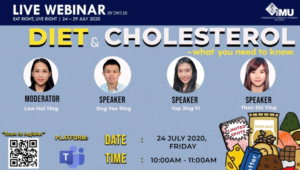 I was grateful for the dietetics skills that I learnt for the past 4 years, skills which were put to good use especially during times of a movement-controlled operation. From the beginning, it was a great learning experience when I accepted the offer to lead the first webinar ever conducted by students from this programme! I am grateful for my supervisor, Jamilah Bt Abdul Jamil, the faculty members and my peers who had supported me throughout the webinars. Though challenging, it was fruitful as I managed to learn and explore new skills to ensure a smooth implementation. To me, this was one of the projects that I can really relate to and witness the significance of teamwork to produce a successful outcome. It is always important to work closely and have the full cooperation from team mates to prevent any delays in work progress and miscommunication. In the midst of preparation, we managed to handle the project specifications and requirements before it was too late for promotional activities.
I was grateful for the dietetics skills that I learnt for the past 4 years, skills which were put to good use especially during times of a movement-controlled operation. From the beginning, it was a great learning experience when I accepted the offer to lead the first webinar ever conducted by students from this programme! I am grateful for my supervisor, Jamilah Bt Abdul Jamil, the faculty members and my peers who had supported me throughout the webinars. Though challenging, it was fruitful as I managed to learn and explore new skills to ensure a smooth implementation. To me, this was one of the projects that I can really relate to and witness the significance of teamwork to produce a successful outcome. It is always important to work closely and have the full cooperation from team mates to prevent any delays in work progress and miscommunication. In the midst of preparation, we managed to handle the project specifications and requirements before it was too late for promotional activities.
It certainly had its ups and down, in the organising the webinar. Since virtual seminar was relatively new, most of us were confused and were uncertain on how to identify the focus areas during the initial phase. It might have been due to the fact that the students had only prior exposure doing face-to-face sessions at the hospitals handling patients with comorbitites.
More importantly, internet connection was a critical factor to be of concern, and true enough, during one of the webinars, my peers encountered such issues. Nevertheless, they managed to deliever the message without any major delay. Despite all the challenges, we managed to execute the webinar successfully. The webinars received good feedback especially the speakers’ ability to engage the audiences with interactive activities such as quiz and Q and A sessions. I personally believe all students did their best to deliver the messages that will have a lasting impact to the audience.
During the times of being quarantined during the COVID-19 pandemic, digital dietetics practice plays an important role in the community to raise awareness on public health.
Although I am glad that I was involved in leading this webinar project, I was doubtful at first. This is because I foresee that we will not be able to conduct discussions physically, and I am personally unsure of the effectiveness in communication across media. However, it turned out to be great when communication was made clearly and a close contact with one another through media such as WhatApps was maintained. It was a worthwhile experience where I received encouraging comments despite all the worries as a leader. Thanks to technology today, I managed to learn the required IT skills with just a search on the internet. With this opportunity, I also learnt the basis of conducting a webinar such as knowing how to attract audience after understanding the normal human behaviours of people attending webinars ar a virtual platform. This is because most people were occupied with their own work before the screen and it could be challenging to keep their full attention in the virtual platform. From this experience, I learnt ways to attract the audience as a moderator by having interaction with the speakers and audience. On top of that, I’m glad that I have also learnt ways to wrap up the topics presented in a simple and holistic way. During the webinar, it was important to make the nutrition education delivery as attractive as possible despite the large amount of scientific sharing. Being a patient centred dietitian, it is important to simplify our nutrition education to the audience’s understanding and this skill is fairly important in the dietetic field. As a future dietitian soon, I hope I could contribute the skills I have learnt and in a digital dietetics platform with my newly leant skill. With that, I hope everyone will eat right, live right and stay safe. Cheers!
Written by Celine Tan Shir Ping, DN116




